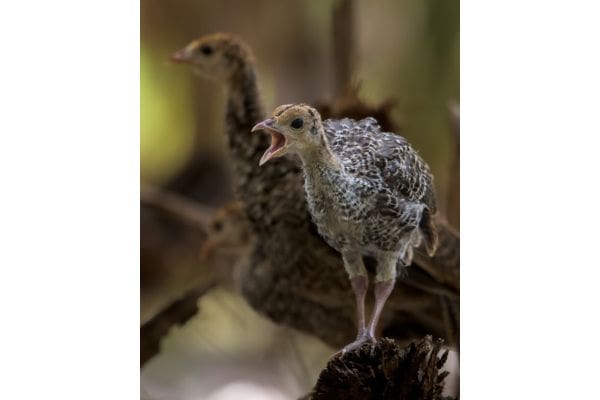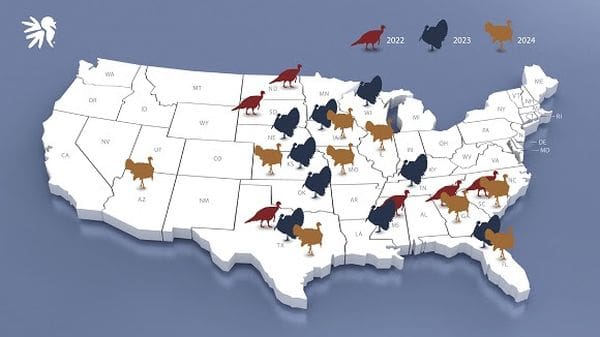NWTF, Partners Allocate Nearly $6 Million to Wild Turkey Research Projects for 2024

EDGEFIELD, S.C.—Via its largest single annual investment in wild turkey research, the NWTF recently distributed $655,447 to nine wild turkey research projects for the organization’s 2024 allocation. Between NWTF funding and partner support, about $6 million will support the nine wild turkey research projects.
“Thanks to our volunteers, partners and staff, our National RFP program has become a powerhouse for energizing wild turkey research and infusing needed funding into projects with practical management applications,” NWTF co-CEO Kurt Dyroff said. “This third investment in just over two years represents the NWTF’s commitment to ensuring wild turkey managers and policymakers are using the best available science to manage and guide the sustainability of our beloved bird, while also increasing our understanding of wild turkey ecology in an ever-changing world.”
The boosted funding has brought the NWTF’s investment in wild turkey ecology research — in just over two years — to $1,597,821 through its National Wild Turkey Request for Proposals program.
Funding for this year’s RFP investment was made possible thanks to significant contributions from the Bass Pro Shops and Cabela’s Outdoor Fund, Mossy Oak and NWTF state chapters.
“Since we began our aggressive research strategy in 2022, we have been able to grow our RFP investment each year because of our extraordinary partners, donors and volunteers who understand the importance science plays in guiding the conservation of the wild turkey,” NWTF co-CEO Jason Burckhalter said. “We will continue our robust annual RFP program to fund practical research, helping reverse declining numbers and ensuring stable populations remain anchored.”
Project proposals were compiled, ranked and scored by the NWTF Wild Turkey Technical Committee and NWTF conservation leadership. The cross-branch partnership among wild turkey biologists, researchers and agency leadership allows for an expert-level, non-biased approach to scoring and ranking the projects on their scientific rigor, partner engagement, secured matching funds and the applicability of each project toward NWTF’s key areas of emphasis.
Key areas of emphasis for the NWTF include wildlife disease studies, developing regional and national population estimates, and evaluating and developing habitat management practices that would increase turkey nest success and poult survival, among others. Learn more about specific areas of importance for the NWTF’s 2024 RFP.
Like previous years, funding for this year’s projects will occur over a multiyear duration. The NWTF’s 2024 investment is providing vital funding for the nine projects each year the necessary work takes place.

Projects for 2024 funding include:
Arizona: Determining Nest Selection and Initiation Dates, Habitat Use, Dispersal and Survivability of Translocation Through the Use of GPS Transmitters
Florida: Turkey Vital Rates Response to Habitat Quality and Supplemental Feeding
Florida: Integrating Data Sources to Quantify Wild Turkey Abundance
Georgia and South Carolina: Gobbling Activity of Individual Male Wild Turkeys
Iowa: Identification of Mammalian Predators of Wild Turkey Nests and Females Using Genetic Techniques
Iowa, Illinois, Missouri, Texas: Spatiotemporal Variation in Wild Turkey Exposure to Neonicotinoid Insecticides in the United States
Kansas: Effects of Land Cover and Precipitation Gradient on the Relative Risk of Predation of Wild Turkeys in Kansas
Texas: Habitat Suitability Model for Wild Turkeys in East Texas
Texas: Investigating Diet, Disease and Population Dynamics Through Metabarcoding, Citizen Science and State Demographic Models
“While these individual research projects take place in one, or in some cases multiple, states, the findings are not bound to those states; rather, they help further our overall understanding of wild turkey ecology and management as a whole, having applications beyond state lines,” said Mark Hatfield, NWTF national director of science and planning. “Wild turkey management today is not the same as it was in the 1970s, and it won’t be the same 50 years from now. Research with practical management applications is how we ensure we are doing what is best for the bird at the right place, at the right time and at the right scale.”
Learn about the projects from the NWTF’s 2023 $582,374 investment
Learn more about the projects from the NWTF’s 2022 $360,000 investment
“Request for Proposals” was a term used internally by NWTF conservation staff. But in 2022, NWTF conservation leadership envisioned a public-facing program that could be implemented year after year. This program would allow the organization’s members and the entire outdoors community to see the significant investments being made into addressing the most pressing concerns around wild turkey management and the overall sustainability of the bird.
Learn more about how the NWTF’s RFP program works.
About the National Wild Turkey Federation
Since 1973, the National Wild Turkey Federation has invested over half a billion dollars into wildlife conservation and has positively impacted over 23 million acres of critical wildlife habitat. The NWTF has also invested over $9 million into wild turkey research to guide the management of the wild turkey population and to ensure sustainable populations into perpetuity. The organization continues to deliver its mission by working across boundaries on a landscape scale through its Four Shared Values: clean and abundant water, healthy forests and wildlife habitat, resilient communities, and robust recreational opportunities. With the help of its dedicated members, partners and staff, the NWTF continues its work to provide Healthy Habitats. and Healthy Harvests. for future generations.
